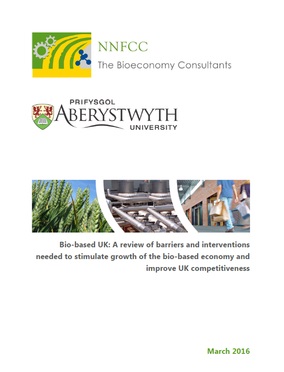Highlights
- Analysis of the UK’s bioeconomy innovation system, focusing on industrial biotechnology, biorefinery, bio-based products and public policy.
- Identifies opportunities and barriers for the development of the biobased economy and policy interventions that would help realise the UK’s potential.
- Building on a wide range of recent stakeholder consultations and studies, including the Biohorizons EU survey of bioeconomy barriers.
Reasons to buy
- Ideal for investors and developers to help navigate the structure of the UK bioeconomy innovation system, including networks, policies, funding, markets facilities, and developments.
- Guidance for policy makers and industry to overcome barriers to UK bioeconomy innovation.
- Detailed discussion to inform you about the progress, debates and issues around industrial biotechnology in the UK, including sustainability and social factors, as well as technical and policy.
Number of pages: 43
Accessibility: This item is available to all NNFCC subscribers or through individual purchase
Summary
The UK’s bioeconomy has the potential to be world leading. However, political, economic, and social barriers are holding back innovation in this sector. Key interventions are needed to allow bioeconomic innovation to flourish.
The focus of the study was on the production of bio-based products, biofuels, and the development of industrial biotechnology (IB), as key areas of innovation.
Recent estimates value the UK bioeconomy at £153–180 billion in gross value-added (GVA) terms, generating over 4 million jobs. However, there is large potential for growth through innovation. For example, The Chemistry Growth Partnership estimated the economy would benefit £8 billion by 2030 by switching chemical feedstocks to biomass, and grow £4–12 billion per year if smart industrial biotechnology were adopted.
The UK has a strong and lengthy track record in science and innovation, but has been slower to take up and support bioeconomy innovation, with the exception of biopharmaceuticals, compared to other leading countries such as the USA, Brazil, France, Italy, Germany and Scandinavian countries.
Action Areas
Through analysis of recent publications, consultations, and work carried out by NNFCC, the following action areas were identified as necessary to lift barriers for UK bioeconomy innovation:
- Provide continuity of policy to give investors’ confidence in the bioeconomy
- Attract large companies to developing bioeconomy innovation clusters
- Demonstration of innovative technology
- Use Public Procurement to develop markets for bio-based products
- Raise public awareness and understanding of bio-based products
Acknowledgments
This report was made possible through the support of the Climate KIC Biohorizons and Bio Base NWE projects.
An article summarising the findings of this study was published in BioFPR Journal January 2016 Five recommendations to kick-start bioeconomy innovation in the UK

Contents of full report
Abstract
Introduction
UK Bioeconomy in global context
Industrial Biotechnology- size and growth of market
Government driven bioeconomy
Barriers and interventions
1. Continuity of Policy
Government working groups
Trade Associations
Third sector
Progress of engagement with policy makers
Recommendations
2. Attract ‘tall trees’
Skills
Finance
Recommendations
3. Demonstration of innovative world leading technology
Research
Demonstration facilities and Establishing best conversion routes for biomass
Recommendations
4. Use Public Procurement to develop markets for bio-based products
Current market incentives
Public Procurement
Recommendations
5. Public awareness and acceptance of bioeconomy innovations
Initiatives to improve awareness
Public Opinion on biotechnology
Genetic technologies
Bioenergy and biofuels
Sustainability
Factors for public optimism and acceptance
Recommendations
Bibliography
You may also be interested in: